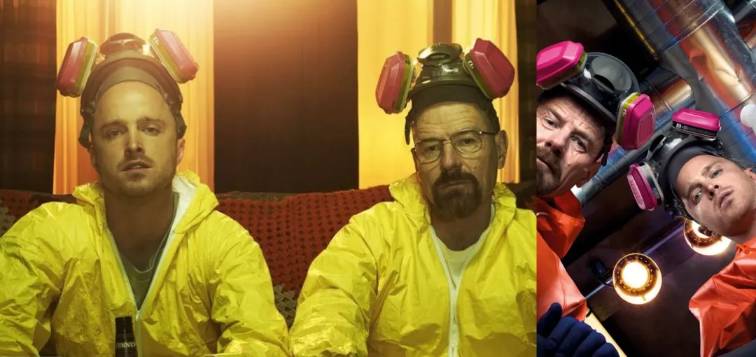Breaking Bad: A Heartfelt Infatuation with the Depths of Morality
5 min read
30 Apr 2025
"Breaking Bad," the critically acclaimed television series created by Vince Gilligan, stands as a monumental testament to storytelling's power to captivate and resonate on a profound level. For many, it has transcended the status of a mere show to become an all-time favorite, sparking a deep love affair that defies time. The reasons behind this affection are as intricate as the moral dilemmas explored within the series itself—embracing complex characters, moral ambiguity, masterful writing, and a transformative journey into the human psyche.
The Chemistry of Characters: Portraits of Complexity
At the core of "Breaking Bad" lies an ensemble of characters as multifaceted as they are compelling. The transformation of Walter White, portrayed by Bryan Cranston, from a meek high school chemistry teacher to a ruthless drug lord, is a masterclass in character development. The gradual unraveling of Walter's morality, driven by desperation and a desire for control, serves as a potent catalyst for the show's exploration of the human condition.

Similarly, characters like Jesse Pinkman (Aaron Paul), Saul Goodman (Bob Odenkirk), and Gustavo Fring (Giancarlo Esposito) are crafted with depth and nuance. Each character is a prism through which the show refracts themes of identity, ambition, loyalty, and the consequences of one's choices.
Moral Uncertainty: A Canvas of Gray
"Breaking Bad" challenges conventional notions of morality by immersing viewers in a world where ethical boundaries are blurred. Walter White's descent into the criminal underworld is a testament to the show's willingness to delve into the darkest recesses of human nature. The moral ambiguity that permeates the narrative invites viewers to question their own beliefs and confront uncomfortable truths about their capacity for darkness.
The show's creators understand that morality is not a binary concept but a spectrum of gray. This exploration of moral uncertainty taps into the primal allure of humanity's capacity for both good and evil, evoking empathy for characters who navigate this abyss.
Craftsmanship in Writing: Tension, Twists, and Subversion
The narrative craftsmanship of "Breaking Bad" is a tapestry woven with tension, unexpected twists, and narrative subversion. Each episode is a meticulously designed puzzle piece that contributes to the grand mosaic of the story. Moments of suspense are punctuated by shocking revelations, transforming the viewing experience into a rollercoaster of emotions.
The show's ability to subvert expectations is another facet of its allure. Moments that defy conventional storytelling conventions keep viewers engaged and invested, as they never know what to anticipate next. The unpredictability of the narrative enriches the emotional and intellectual engagement, inviting viewers to dissect each scene for clues and foreshadowing.
Metamorphosis of the Protagonist: A Transformative Odyssey
Walter White's metamorphosis from a mild-mannered chemistry teacher to the formidable Heisenberg is one of television's most mesmerizing character arcs. This transformation is a journey of empowerment, driven by a desire to regain control over his life and leave a legacy for his family. As viewers witness his descent into the world of crime, they are both repelled and compelled by the magnetism of his evolution.
The character's duality taps into a primal fascination with the darker aspects of human nature. Walter's transformation serves as a mirror, reflecting the choices and vulnerabilities that define our own lives. This relatability, coupled with the allure of his moral ambiguity, intensifies the emotional connection to his journey.
Exploring Consequences: A Moral Odyssey
"Breaking Bad" meticulously examines the consequences of actions, illuminating the ripple effect of choices on individuals and their relationships. The moral calculus of each decision reverberates through the lives of characters, leaving scars that serve as reminders of their past. This exploration of consequences resonates deeply, prompting viewers to reflect on the impact of their own choices and actions.
The show doesn't shy away from the grim reality of its narrative, a reflection of life's complexities. The honesty in portraying the aftermath of choices adds to the show's authenticity, further anchoring its characters in the realm of reality.
A Profound Impact: A Love that Endures
As of my last knowledge update in September 2021, "Breaking Bad" continues to hold a special place in the hearts of fans. However, developments might have occurred since then. The love affair with the show endures because it is a testament to the unvarnished exploration of the human experience. It delves into our capacity for darkness, resilience in the face of adversity, and the constant interplay between our choices and our identities.
The series is more than just entertainment; it's a journey of introspection. As viewers follow Walter White's path, they engage with their own moral compass, their ethical boundaries, and their understanding of what it means to be human. The love for "Breaking Bad" is a testament to its ability to provoke thought, evoke emotions, and provide a lens through which we contemplate the intricacies of our own lives.
A Saga that Endures
"Breaking Bad" isn't just a television show; it's a mirror held up to our own complexities. Its enduring love affair with audiences is a reflection of its ability to resonate on emotional, intellectual, and philosophical levels. The series offers a glimpse into the fragility of morality, the transformation of identity, and the labyrinth of choices that define us.
The show's allure lies in its willingness to navigate the shadows, unravel the fabric of morality, and lay bare the intricacies of the human experience. As viewers immerse themselves in Walter White's odyssey, they simultaneously embark on their own journey of introspection—a journey that mirrors the enigma of existence itself.


